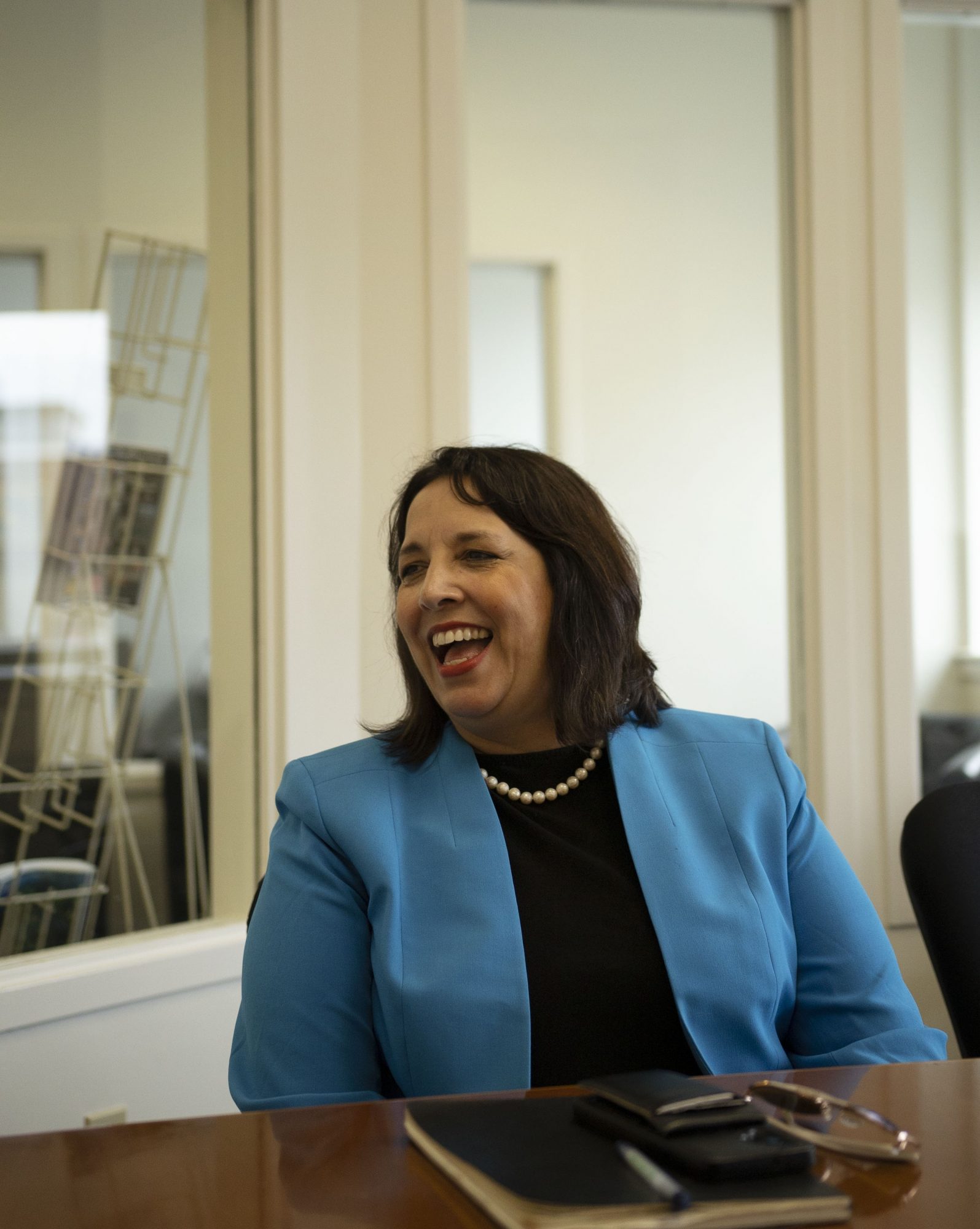LYNN — Salem Mayor Kimberley Driscoll sees the office of the lieutenant governor as a liaison to the commonwealth’s 351 cities and towns — a position in which she could help address their concerns, and help implement statewide policies that could lead to a greater quality of life.
Driscoll, who is one of three democrats running for the position, said she believes her experience sets her apart from her opponents.
“I have run and managed a city,” Driscoll said in an interview with The Item’s editorial board Tuesday afternoon. “I’m not talking about expanding early childcare in the abstract, or tackling the climate crisis as an idea, as a policy. We’ve actually got a Climate Action Plan, we’re implementing it. Having that on-the-ground experience requires you to deliver results for people every day is very much in my estimation, a different set of experiences that you have when you’re a legislator.”
If voters on Sept. 6 select Driscoll over state Rep. Tami Gouveia and state Sen. Eric Lesser, she would join Attorney General Maura Healey, the Democratic nominee for governor, to form a ticket. Driscoll, who has endorsed Healey, said she looks forward to what they could accomplish together.
“She’s been a fabulous attorney general, brings executive chops, has a statewide, frankly, nationwide, value system, and experience working on really important policies. I bring the boots-on-the-ground experience from the community. When you think about the challenges that a state has, particularly the Commonwealth of Massachusetts, housing COVID recovery, tackling the climate crisis, working to strengthen schools, that’s the work that you do when you’re a mayor,” Driscoll said. “I can’t think of a better kind of training ground to support our next governor than someone who has been a mayor every single day having to make decisions that impact people. You’re close to the ground, and you have to deliver.”
After logging 16 years as Salem’s mayor, Driscoll said she decided to run for statewide office because of her belief that as lieutenant governor she can leverage her experience to help improve quality of life for people across the Commonwealth.
“I really care about cities … in my experience in Salem, you need a strong state partner, you need a combination of efforts between hopefully intentional, strong local leadership, combined with opportunities that the state has to bridge resource divides, technical assistance divides, and to help,” she said. “The ability to sort of combine opportunities on the ground locally to impact the quality of life with statewide policies, initiatives, and resources for me is really powerful. That’s what’s motivating me.”
In conversations across the state, housing has come up time and again as the chief concern on voters’ minds, Driscoll said.
“Not enough housing, not enough housing that’s affordable for people who live in communities, even in communities where housing is more affordable as we head out towards Central and Western Mass. you do have housing that’s a little bit more affordable, but it’s not more affordable to the people living there,” she said. “The cape is in an all-out crisis around housing, the COVID recovery for them looked like a lot of people buying second homes, and that has removed housing from their inventory, even more so than typical. And that’s impacting workforce. And, you know, this housing issue for me is very much a moral one. I really believe everyone has a right to a safe, affordable, accessible roof over their head.”
Driscoll said one key to solving the housing crisis would be to implement a housing production plan in every city and town — a step she has already taken in Salem.
“There are strategies that we can put in place but right now we’re doing that 351 cities and towns at a time and how do we think about the state really being a partner, whether it’s helping with the technical assistance, those housing production plans, developing the regional strategies, leaning in on housing choice, the statewide legislation that was adopted, leveraging state land,” she said. “The fear factor here is if we don’t figure out housing, we’re going to be less competitive, and we are certainly not going to be able to attract and maintain the talent. The key to our strength from an economy has been all the smart people that graduate and stay here and the amazing research that’s happening.”
Massachusetts, often a national leader on issues, has fallen behind on child care, Driscoll said, citing Alabama’s Pre-K program as a model Massachusetts could draw inspiration from.
“The state of Alabama, every 4-year-old has high-quality Pre-K, for free, that was pushed for by the business community in Alabama because they saw the throughput for both their own workforce and your youngest learners. We’ve had a lot of talk about early child care, but we haven’t necessarily implemented models that develop early child care opportunities within communities and it could look very different,” Driscoll said. “It really takes some upfront work and analysis and here’s a perfect place for the state to help communities, most of our cities are seeing declining enrollment … so there are strategies that we could work to do more in that place and we just, we haven’t pulled the trigger on these things yet.”
If elected, Driscoll would leverage her experience as mayor in working with communities to implement statewide strategies.
“I’m somebody that can be a strong partner to them and a strategic ally for the work that’s underway. Opportunities to communicate to understand what’s happening on the ground, and how statewide strategies can play a role in incentivizing the vision that they have for their communities in their region will be critical,” she said.
Charlie McKenna can be reached at [email protected].

